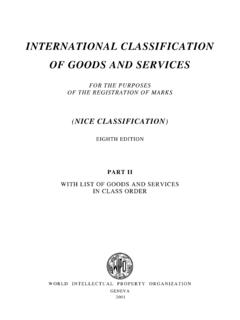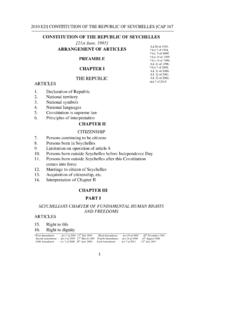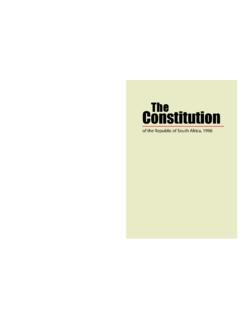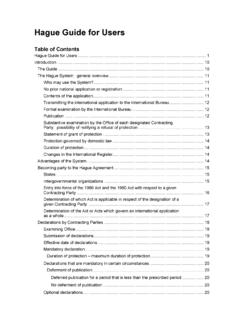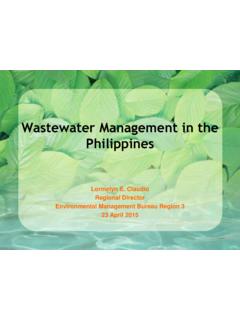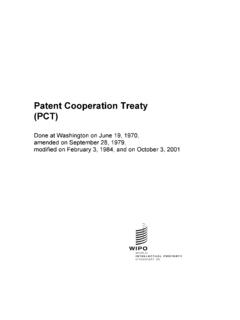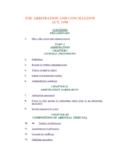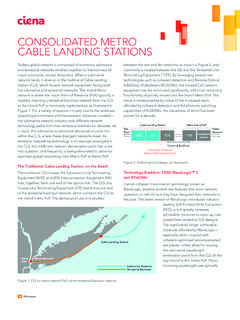Transcription of Electronic Communications Act 2005 (Act No. 36, 2005)
1 Cape Town,Vol. 490182006 AprilNo. 28743 THE PRESIDENCY No. 364 18 April 2006 It is hereby notified that the President hasassented to the following Act, which ishereby published for general informa-tion: No. 36 of 2005: Electronic Communi-cations Act, 771682 58400328743 ACTTo promote convergence in the broadcasting, broadcasting signal distribution andtelecommunications sectors and to provide the legal framework for convergence ofthese sectors; to make new provision for the regulation of Electronic communica-tions services, Electronic Communications network services and broadcastingservices; to provide for the granting of new licences and new social obligations; toprovide for the control of the radio frequency spectrum; to provide for thecontinued existence of the Universal Service Agency and the Universal ServiceFund.
2 And to provide for matters incidental IT ENACTED by the Parliament of the Republic of South Africa, asfollows: ARRANGEMENT OF SECTIONSS ectionsCHAPTER 1 INTRODUCTORY of ActCHAPTER 2 POLICY AND Policies and Policy by AuthorityCHAPTER 3 LICENSING of provision of service without and conditions for for and granting of individual of individual of individual of individual of individual licence or change of or cancellation of individual of suspension, cancellation, surrender or expiry of individual for class licence2No. 28743 GOVERNMENT GAZETTE, 18 APRIL 2006 Act No. 36, 2005 Electronic Communications ACT, 2005 (English text signed by the President.)(Assented to 11 April 2006.) of registration for class of class licenceCHAPTER 4 Electronic Communications NETWORKS ANDCOMMUNICATIONS for rapid deployment of Electronic Communications upon and construction of lines across land and pipes for purposes of Electronic Communications network under of Electronic Communications network obstructing Electronic Communications network or depth of Electronic Communications network worksCHAPTER 5 RADIO FREQUENCY of radio frequency frequency spectrum of possession of radio frequency planCHAPTER 6 TECHNICAL EQUIPMENT AND of standards for equipment and Electronic Communications facilitiesCHAPTER to of interconnection of interconnection pricing pre-selectionCHAPTER 8 Electronic Communications FACILITIES to lease Electronic Communications Communications facilities leasing of Electronic Communications facilities leasing of Electronic Communications facilities leasing agreement
3 Leasing pricing principles4No. 28743 GOVERNMENT GAZETTE, 18 APRIL 2006 Act No. 36, 2005 Electronic Communications ACT, 2005510152025303540 CHAPTER 9 BROADCASTING broadcasting service broadcasting service broadcasting service on granting of broadcasting service licence to of programmes broadcast by broadcasting service of conduct for broadcasting service over on broadcasting of party election broadcasts and politicaladvertisements except in certain of party election broadcasts on public broadcasting advertising on broadcasting treatment of political parties by broadcasting service licenseesduring election on subscription broadcasting of South African signal distribution provisioning by broadcasting service on foreign control of commercial broadcasting on control of commercial broadcasting on cross-media control of commercial broadcasting servicesCHAPTER 10 COMPETITION mattersCHAPTER plans and number portabilityCHAPTER 12 CONSUMER of conduct.
4 End-user and subscriber service with Advisory PanelCHAPTER of Electronic Communications and ICT Museum, informationcommunication technology for government and other related and of public emergency Communications of 112 Emergency Centres and Public emergency , capabilities and operating procedures of 112 Emergency Centres6No. 28743 GOVERNMENT GAZETTE, 18 APRIL 2006 Act No. 36, 2005 Electronic Communications ACT, 200551015202530354045 CHAPTER 14 UNIVERSAL SERVICE AND ACCESS AGENCY OF SOUTH existence of Universal Service of of and staff of of and other existence and control of Universal Service of money in Universal Service and Access to Universal Service and Access tender for universal service and access of Universal Service and Access FundCHAPTER 15 TRANSITIONAL of and amendment of title and commencementSCHEDULECHAPTER 1 INTRODUCTORY this Act, unless the context indicates otherwise affiliate means with respect to any person, any other person that, directly orindirectly (a)controls thefirst mentioned person;(b)is controlled by thefirst mentioned person; or(c)is under common control, with thefirst mentioned person; Agency means the Universal Service and Access Agency of South Africaestablished by section 80.
5 Authority means the Independent Communications Authority of South Africaestablished by section 3 of the Independent Communications Authority of SouthAfrica Act, 2000 (Act No. 13 of 2000); broadcasting means any form of unidirectional Electronic communicationsintended for reception by (a)the public;(b)sections of the public; or(c)subscribers to any broadcasting service,whether conveyed by means of radio frequency spectrum or any electroniccommunications network or any combination thereof, and broadcast isconstrued accordingly; Broadcasting Act means the Broadcasting Act, 1999 (Act No. 4 of 1999); broadcasting service means any service which consists of broadcasting andwhich service is conveyed by means of an Electronic Communications network, butdoes not include 8No. 28743 GOVERNMENT GAZETTE, 18 APRIL 2006 Act No. 36, 2005 Electronic Communications ACT, 20055101520253035404550(a)a service which provides no more than data or text, whether with or withoutassociated still images;(b)a service in which the provision of audio-visual material or audio material isincidental to the provision of that service, or(c)a service or a class of service, which the Authority may prescribe as not fallingwithin this definition; broadcasting service licensee means a person to whom a broadcasting servicelicence has been granted in terms of this Act; broadcasting service radio frequency bands means that part of the electro-magnetic radio frequency spectrum which is allocated for the use of broadcastingservices by the Authority, taking into account the ITU table of allotment, in so faras such allocation has been agreed to or approved by the Republic.
6 Broadcasting service licence means a licence granted by the Authority to aperson in terms of section 5(2)(b)or section 5(4)(b); broadcasting signal distribution means the process whereby the output signalof a broadcasting service is taken from the point of origin, being the point wheresuch signal is made available in itsfinal content format, from where it is conveyed,to any broadcast target area, by means of Electronic Communications and includesmulti-channel distribution; carrier pre-selection means the ability of a subscriber of an electroniccommunications service to access and use the Electronic Communications servicesof another Electronic Communications service licensee or person exempted asprovided for in section 6; channel means a single defined programming service of a broadcasting serviceslicensee; class licence means a licence granted by the Authority to a person in terms ofsection 5(4); class licensee means a person to whom a class licence has been granted in termsof this Act; commercial broadcasting means a broadcasting service operating for profitoras part of a profit entity but excludes any public broadcasting service; common carrier means a person licensed to provide an Electronic communi-cations network service who is obliged to provide signal distribution forbroadcasting services on a non-discriminatory and non-exclusive basis; community includes a geographically founded community or any group ofpersons or sector of the public having a specific, ascertainable common interest; community broadcasting service means a broadcasting service which (a)is fully controlled by a non-profit entity and carried on for non-profitpurposes;(b)serves a particular community.
7 (c)encourages members of the community served by it or persons associated withor promoting the interests of such community, to participate in the selectionand provision of programmes to be broadcast in the course of suchbroadcasting service; and(d)may be funded by donations, grants, sponsorships or advertising ormembership fees, or by any combination of the aforementioned; Competition Act means the Competition Act, 1998 (Act No. 89 of 1998); Complaints and Compliance Committee means the committee established bythe Authority in terms of section 17A of the ICASA Act; days means working days unless otherwise specified; Director-General means the Director-General of the Department of Commu-nications; dominant has the same meaning given to that term in section 7 of theCompetition Act; election means an election as defined in section 1 of the Electoral Act, 1998 (ActNo. 73 of 1998); election period means the period commencing with the date on which theelection day is proclaimed and ending on the day immediately following upon theday on which candidates of any of the political parties are declared elected; Electronic Communications means the emission, transmission or reception ofinformation, including without limitation, voice, sound, data, text, video, anima-tion, visual images, moving images and pictures, signals or a combination thereofby means of magnetism, radio or other electromagnetic waves, optical, electro-10No.
8 28743 GOVERNMENT GAZETTE, 18 APRIL 2006 Act No. 36, 2005 Electronic Communications ACT, 200551015202530354045505560magnetic systems or any agency of a like nature, whether with or without the aid oftangible conduct, but does not include content service; Electronic Communications facility includes but is not limited to any (a)wire;(b)cable (including undersea and land-basedfibre optic cables);(c)antenna;(d)mast;(e)satellite transponder;(f)circuit;(g)cable landing station;(h)international gateway;(i)earth station; and(j)radio apparatus or other thing,which can be used for, or in connection with, Electronic Communications , includingwhere applicable (i) collocation space;(ii) monitoring equipment;(iii) space on or within poles, ducts, cable trays, manholes, hand holds andconduits; and(iv) associated support systems, sub-systems and services, ancillary to suchelectronic Communications facilities or otherwise necessary for controllingconnectivity of the various Electronic Communications facilities for properfunctionality, control, integration and utilisation of such Electronic communi-cations facilities; Electronic Communications network means any system of Electronic commu-nications facilities (excluding subscriber equipment), including without limita-tion (a)satellite systems;(b)fixed systems (circuit- and packet-switched);(c)mobile systems;(d)fibre optic cables (undersea and land-based);(e)electricity cable systems (to the extent used for Electronic communicationsservices); and(f)other transmission systems, used for conveyance of Electronic communica-tions.
9 Electronic Communications network service means a service whereby aperson makes available an Electronic Communications network, whether by sale,lease or otherwise (a)for that person s own use for the provision of an Electronic communicationsservice or broadcasting service;(b)to another person for that other person s use in the provision of an electroniccommunications service or broadcasting service; or(c)for resale to an Electronic Communications service licensee, broadcastingservice licensee or any other service contemplated by this Act,and network services is construed accordingly; Electronic Communications network service licensee means a person to whoman Electronic Communications network service licence has been granted in terms ofsection 5(2) or 5(4); Electronic Communications service means any service provided to the public,sections of the public, the State, or the subscribers to such service, which consistswholly or mainly of the conveyance by any means of Electronic communicationsover an Electronic Communications network, but excludes broadcasting services; Electronic Communications service licensee means a person whom anelectronic Communications services licence has been granted in terms of section5(2); emergency organisation means, in respect of any locality, the relevant police,fire, ambulance or traffic authority or coast guard services for that locality and anyother similar organisation providing assistance to the public in emergencies; end-usermeans a subscriber and persons who use the services of a licensedservice referred to in Chapter 3.
10 Essential facility means an Electronic Communications facility or combinationof Electronic Communications or other facilities that is exclusively or predomi-nantly provided by a single or limited number of licensees and cannot feasibly12No. 28743 GOVERNMENT GAZETTE, 18 APRIL 2006 Act No. 36, 2005 Electronic Communications ACT, 200551015202530354045505560(whether economically, environmentally or technically) be substituted or dupli-cated in order to provide a service in terms of this Act; existing licences means the licences granted to persons prior to the coming intoforce of this Act in accordance with the provisions of the Telecommunications Act,the IBA Act or the Broadcasting Act; financial interest means an interest that may not have voting rights attached toit but which gives the person or entity an equity or debt interest directly throughshares or other securities or indirectly through an agreement giving it (a)the power to control the licensee; or(b)an effective say over the affairs of the licensee; free-to-air service means a service which is broadcast and capable of beingreceived without payment of subscription fees; harmful interference means interference which (a)seriousl

